Jun
8
2010

“Then all the people shouted with a great shout, when they praised the LORD, because the foundation of the house of the LORD was laid. But many of the priests and Levites and heads of the fathers’ houses, old men who had seen the first temple, wept with a loud voice when the foundation of this temple was laid before their eyes.” Ezra 3:11-12
Doug Wilson writes (Less Glory Is More):
The Bible teaches us that the times of the new covenant are attended with a greater glory than the old covenant, as well as with a greater simplicity. In effect, that simplicity is part of the glory.
Continue reading
2 comments | tags: AD70, Communion, Covenant Theology, Doug Wilson, Ezekiel's Temple, Ezra, Solomon, Totus Christus | posted in Quotes, The Last Days, The Restoration Era
May
25
2010

Mother of Pearl
If you are a modern Christian and you haven’t read James B. Jordan’s Through New Eyes, you won’t appreciate all the Bible has to offer. We’ve looked at some of the meanings of the gemstones on the breastplate of the High Priest. That’s Adam. What about Eve?
Continue reading
Comments Off | tags: Esther, Greater Eve, High Priest, James Jordan, Revelation | posted in Biblical Theology, The Restoration Era
May
15
2010

.
More on a “temporary” New Jerusalem…
We are establishing the colonies of heaven here, now. When we die, we get the privilege of visiting the heavenly motherland, which is quite different from moving there permanently. After this brief visit, the Lord will bring us back here for the final and great transformation of the colonists (and the colonies). In short, our time in heaven is the intermediate state. It is not the case that our time here is the intermediate state. There is an old folk song that says, “This world is not my home, I’m just passing through.” This captures the mistake almost perfectly. But as the saints gather in heaven—which is the real intermediate state—the growing question is, “When do we get to go back home?” And so this means that heaven is the place that we are just passing through.
— Doug Wilson, Heaven Misplaced, p. 24.
2 comments | tags: Doug Wilson, Postmillennialism | posted in Against Hyperpreterism, Apologetics, Biblical Theology, Quotes, The Restoration Era, Totus Christus
May
4
2010
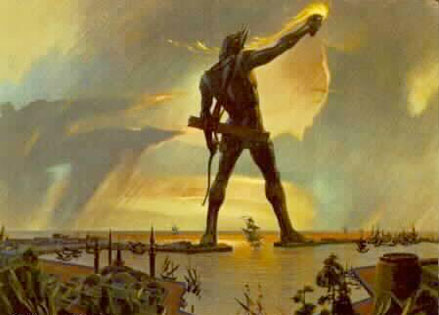
For he is our peace, who has made us both one, and has broken down the dividing wall of hostility, by abolishing in his flesh the law of commandments and ordinances, that he might create in himself one new man in place of the two, so making peace, and might reconcile us both to God in one body through the cross, thereby bringing the hostility to an end. And he came and preached peace to you who were far off and peace to those who were near; for through him we both have access in one Spirit to the Father. (Ephesians 2:14-18)
So, the New Jerusalem—at least the way it is described in Revelation 21—is the culmination of all the “Day 6s” since the original in the Garden of Eden. And, like the walls of water at the Red Sea and Jordan crossings, this entire, miraculous arrangement is held together by the Mediator-Man, the Lamb standing at the centre.
Continue reading
Comments Off | tags: 666, AD70, Ezra, Genesis, Herod, Nehemiah, oikoumene, Revelation, Solomon, Totus Christus | posted in Biblical Theology, The Last Days, The Restoration Era, Totus Christus
May
1
2010
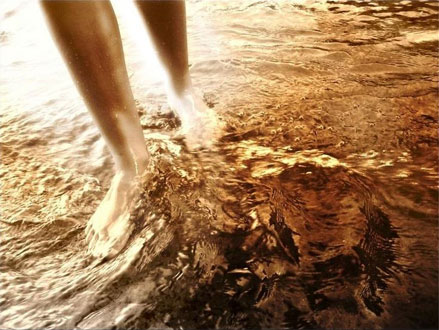
or The New Jerusalem is Temporary
He will set up a banner for the nations, And will assemble the outcasts of Israel, And gather together the dispersed of Judah From the four corners of the Land. Also the envy of Ephraim shall depart, And the adversaries of Judah shall be cut off; Ephraim shall not envy Judah, And Judah shall not harass Ephraim. But they shall fly down upon the shoulder of the Philistines toward the west; Together they shall plunder the people of the East; They shall lay their hand on Edom and Moab; And the people of Ammon shall obey them. The LORD will utterly destroy the tongue of the Sea of Egypt; With His mighty wind He will shake His fist over the River, And strike it in the seven streams, And make men cross over dry-shod. There will be a highway for the remnant of His people Who will be left from Assyria, As it was for Israel In the day that he came up from the land of Egypt. (Isaiah 11:12-16)
Everyone knows what “walking on water” means. You can do the impossible. Often it has a negative spin, as when it is applied to politicians with a Messiah-complex.
But what does it actually mean in the Bible? And why did Jesus do it?
Continue reading
6 comments | tags: AD70, Against Hyperpreterism, Atonement, Baptism, Daniel, Herod, High Priest, Isaiah, Passover, Tabernacle, Totus Christus | posted in Biblical Theology, Creation, The Last Days, The Restoration Era
Apr
25
2010
 Great stuff from Peter Leithart’s blog:
Great stuff from Peter Leithart’s blog:
Michael Stead (The Intertextuality of Zechariah 1-8 (Library of Hebrew Bible/Old Testament Studies)) points to a number of intertexual connections between Ezekiel 1-11 and the vision of Zechariah 5:5-11. He concludes that the vision of Zechariah is an inversion of the Ezekiel’s vision of Yahweh’s departing glory: “Ezekiel 1-11 describes the departure of Yahweh from Jerusalem because of the idolatry (Ezek 8), iniquity (Ezek 4) and wickedness (Ezek 5) of his people, and his departure is attended by winged creatures riding on the wind. But, now that Yahweh is returning to dwell in Jerusalem, idolatry/iniquity/wickedness is being forced to depart, in a parody of Yahweh’s earlier departure.”
Continue reading
1 comment | tags: Ark of the Covenant, Ezekiel, Peter Leithart, Resurrection, Zechariah | posted in Biblical Theology, Quotes, The Restoration Era
Apr
19
2010
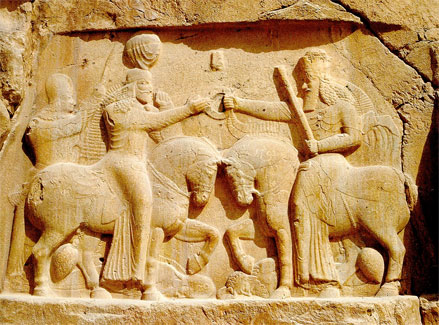
Ralph Smith helpfully applies the five point Covenant model to the history of Israel between the captivity and Christ:
1) Transcendence: God’s sovereign control over the nations was revealed in this period of the old covenant more than any other. Daniel foresaw the whole history of the world from the time of Babylon to the time of establishment of the kingdom of the Messiah (Dan. 2:27ff.; 7:1ff.). Clearly the kingdoms of this world were in His hand and He was guiding history where He willed. For the Jews as a nation, this greater revelation of God’s Kingship was important for they would be apparently in the hands of unbelieving rulers through much of this period, but the fact that God had predicted the history of the entire era from the beginning put all of this in a different light. The Jews learned anew that “The king’s heart is in the hand of the LORD, as the rivers of water: He turneth it whithersoever He will” (Prv. 21:1).
Continue reading
Comments Off | tags: Covenant Theology, Paul, Ralph Smith | posted in Biblical Theology, Quotes, The Restoration Era
Mar
29
2010
or The Self-Maledictory Oath
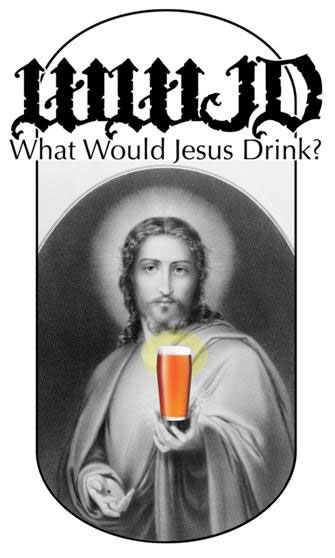
For thus says the LORD God of Israel to me: “Take this wine cup of fury from My hand, and cause all the nations, to whom I send you, to drink it. “And they will drink and stagger and go mad because of the sword that I will send among them.” Then I took the cup from the LORD’s hand, and made all the nations drink, to whom the LORD had sent me…” (Jeremiah 25:15-17)
The content of this post has been revised and included in Bible Matrix II: The Covenant Key.
__________________________________________________________
[1] See Sacramental Doses of Death.
[2] This is the execution of a Covenant curse, so those who fought against Jerusalem were people under the Covenant.
[3]Contrary to popular opinion, I believe that the divided animals substitute for the Canaanites rather than for Abraham, but the birds do substitute for Abraham. The birds are the head of the Covenant, and He is never crushed. Only the serpent’s head is crushed. This also relates to the linen left in Christ’s tomb. The Jew-Gentile body was divided in Abraham and reunited in Christ. See Pass-over and Pass-Through.
[4] See Three Babylons.
[5] This also relates to the disappearance of the pure Covenant-head, the Ark of the Covenant. See The Lost Ark.
Comments Off | tags: Abraham, Ark of the Covenant, Babylon, Covenant Theology, Ezekiel's Temple, Gethsemane, Jeremiah, Numbers 5 | posted in Biblical Theology, The Restoration Era
Mar
24
2010
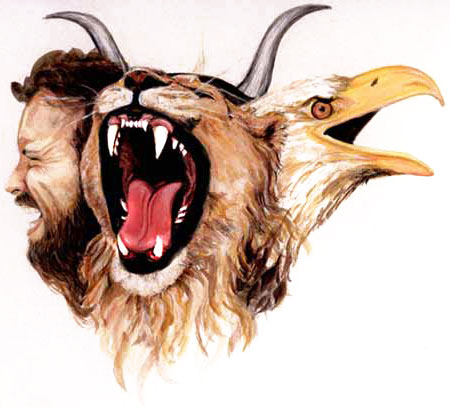
Most commentators, including N. T. Wright, get the Restoration era all wrong. Our history as God’s people is cruciform, which is reflected in the four faces of the cherubim. The Mosaic “bull face” (the Bronze Altar) was replaced with the Davidic “lion face” (the Ark). The Ark was taken by God, and the era of the prophets began, the “eagle face” (the all-seeing Lampstand). Resurrected Israel was to be wise men to Gentile kings, leaven within the kingdoms shown to Nebuchadnezzar. They would not have a Jewish king until the fourth face, the Man, arrived (the Table of Showbread).
Continue reading
1 comment | tags: Esther, Haman, James Jordan, Tabernacle | posted in Quotes, The Restoration Era
Mar
16
2010
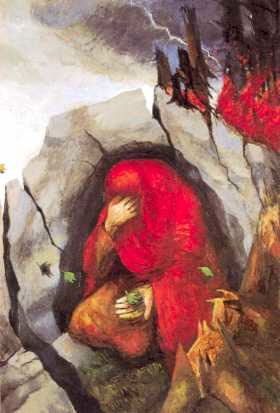
or Sinai Unspoken
On Mount Carmel, Elijah had built an altar of 12 rough-hewn stones. They substituted for the tribes of Israel. They were built and then consumed. The priests of Baal were slain and “washed” in the brook as atonement. The Land was clean. But we know Jezebel trampled this sacrifice underfoot. [1]
Elijah headed for the wilderness. He was a man with a mission. He went to the same cave in which Moses stood, a cleft in the rock. Once again, the Lord “passed over.” He was making a new Covenant, a new Creation, a new Heavens and a new Land.
Continue reading
Comments Off | tags: Azal, Cain, Elijah, Elisha, Ezekiel, Feasts, Hebrew, Jezebel, Tabernacle | posted in Biblical Theology, The Restoration Era



































